Welcome to the Spring Newsletter 2024! As we embrace the new season, this edition brings you the latest updates on our community’s environmental efforts, upcoming events, and opportunities for local involvement.
Below, you’ll find exciting news about collective achievements in environmental restoration, details on the much-anticipated Riverfest 2024, and insights from the recent Aussie Bird Count. We also highlight important initiatives like the Riverbank Vegetation Improvement Project, share critical information on biosecurity, and provide ways for you to contribute to local conservation efforts. Whether you’re passionate about protecting our natural heritage or simply looking to stay informed, read on!
As we wrap up our reporting from the 23-24 financial year, the Environmental Strategies Team is excited to share some significant achievements with the community.
Thanks to the Special Rate Variation, Council's efforts, including the Rural Landholder Initiative (RLI) as well as the outstanding work from our local Landcare groups have collectively made remarkable progress in on-ground works for 2023-2024. These combined efforts have resulted in:
- Restoration efforts on 103 sites spanning 170 hectares
- Planting 28,503 trees
- A collective contribution of 2077.5 person-days
- Collaborations with 92 on-ground partners
- An impressive in-kind value of $800,777
We extend our heartfelt thanks to the Landcare groups for their ongoing commitment to our local environment, and to all the individuals involved, including landholders, bush regenerators, and project officers.
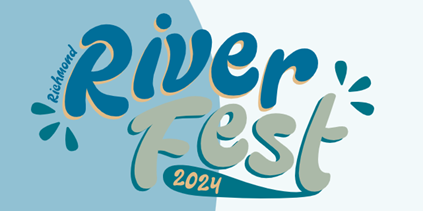
Riverfest 2024 has been announced, kicking off a series of vibrant events dedicated to celebrating our region's rivers and community.
Emphasising the importance of our local rivers, the festival provides a platform for the community to unite and recognise the beauty and significance of our waterways. Join us as we celebrate our stunning rivers and the spirit of togetherness they inspire.
Be sure to visit richmondriverfest.com to stay updated on all the event details for this year's festival.
Please note that event schedules are currently being arranged, so make it a habit to check the website regularly for the most recent updates and information as we approach the festival.
Riverfest is presented by the Richmond Riverkeeper in partnership with Lismore City Council, Northern Rivers Healing Hub, Southern Cross University, Jagun Alliance, OzFish, Border Ranges Richmond Valley Landcare, Richmond Landcare Inc, Wilsons River Landcare, BushFruits Landcare, Richmond Valley Council, Rous County Council, Living Lab Northern Rivers, Positive Change for Marine Life, Brunswick Riverkeepers.
The 2023 Aussie Bird Count was a big success, with Council actively participating in the event.
This annual citizen science initiative provided valuable insights into local bird populations, highlighting both common and vulnerable species in the Lismore Local Government Area (LGA). Below are some of the key findings from the count, showcasing the top 10 most frequently sighted birds and notable observations of vulnerable species in the region.
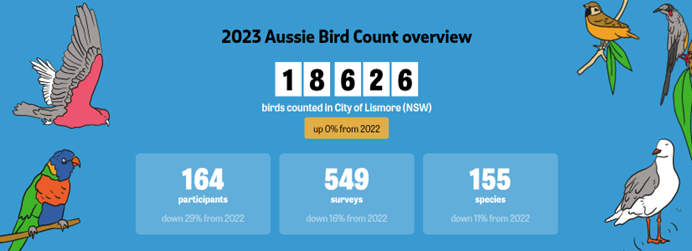
Here are the top 10 sighted species from the Lismore LGA
|
Rank
|
Bird Species
|
Count
|
Reporting Rate %
|
|
1
|
Rainbow Lorikeet
|
4165
|
67.03%
|
|
2
|
Noisy Miner
|
1560
|
54.10%
|
|
3
|
Australian White Ibis
|
928
|
20.22%
|
|
4
|
Australian Magpie
|
741
|
51.73%
|
|
5
|
Little Corella
|
555
|
11.48%
|
|
6
|
Pied Currawong
|
525
|
38.98%
|
|
7
|
Red-browed Finch
|
490
|
12.93%
|
|
8
|
Crested Pigeon
|
482
|
24.23%
|
|
9
|
Welcome Swallow
|
482
|
19.49%
|
|
10
|
Lewin's Honeyeater
|
481
|
32.42%
|
Several bird species from our region that are listed as vulnerable in New South Wales were also spotted. These include:
- Magpie Goose: 2 sightings
- Albert’s Lyrebird: 3 sightings
- Wompoo Fruit-Dove: 17 sightings
- Little Lorikeet: 14 sightings
Join the Aussie Bird Count 2024 - 14-20 October
Unfortunately, there are several bird species in the area listed as vulnerable, endangered, or critically endangered in NSW.
More sightings and reports are essential for conservation organisations to track these birds' movements, monitor their habitats, and implement strategies to help boost their populations. Participating in the Aussie Bird Count is easy, fast and a good excuse to get outdoors. It is one of Australia’s biggest Citizen Science Events. In 2023, 60,500 participants counted 3,608,545 birds across Australia!
In 2024, Birdlife aims to break that record. To join this year’s count, click here and register. The Count itself takes only 20 minutes and is as easy as going for a walk and recording what birds you see.
Bird data
Birdata is BirdLife Australia's national bird monitoring program, containing over 24 million bird sightings spanning half a century. It provides essential data used in publications, legislation, academic research, and is shared with various groups to support Australia's birds.
By participating in the Aussie Bird Count, you are directly contributing to the database of bird species around Australia. Download the Birdata app to join Australia's largest citizen science network and help monitor our bird populations.

The Riverbank Vegetation Improvement Project is an initiative under the Marine Estate Management Strategy (MEMS) aimed at enhancing water quality and reducing pollution in the region’s waterways.
Managed by North Coast Local Land Services, the project works directly with landholders to restore riparian areas on their properties, targeting issues such as soil erosion, nutrient runoff, and water contamination caused by livestock.
This project involves several key activities, including the management of invasive weeds, the rehabilitation and revegetation of riverbanks with native plants, and the installation of alternative water sources and fencing to limit livestock access to waterways. Funding and technical support are provided by North Coast Local Land Services, which partners with experienced bush regeneration companies to carry out the work. A two-year maintenance period is included, after which landholders take over the long-term care of the improvements under a five-year Land Management Deed.
How can landholders apply?
Expressions of interest can be lodged online via www.lls.nsw.gov.au/mems.
Funding will be offered on a competitive basis, with projects that are within the identified target river reaches prioritised. Landholders with properties along targeted creek frontages are encouraged to apply, with priority given to macadamia growers and graziers.
For further information contact Genevieve Maley, Land Services Officer via mems@lls.nsw.gov.au or 0428 394 948.
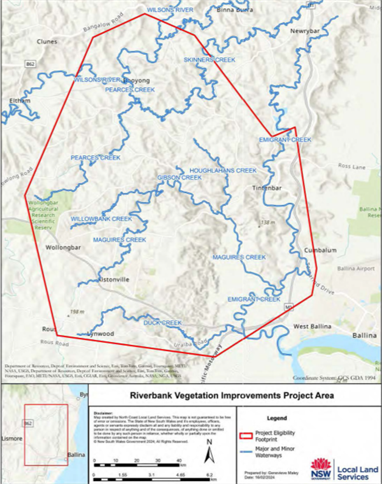
The detection of White Spot in wild-caught prawns in ocean waters near the Evans and Richmond Rivers in May has caused alarm for fisheries and residents.
Fortunately for humans, White Spot detected in prawns do not threaten human health or food safety and remain safe to eat. It's important to note that fin fish are not affected by the disease and are not carriers of it.
What is White Spot?
White spot disease is a highly contagious viral infection that affects crustaceans such as prawns, yabbies, and crabs. The disease is primarily spread through the movement of infected animals or contaminated water. Birds that feed on and move infected animals can also spread the disease. Although marine worms have been suspected as potential carriers of the disease in other regions, extensive testing in Moreton Bay has shown that the risk is extremely low.
Mitigation
The NSW Department of Primary Industries has set up biosecurity control zones in the Clarence River area and the Evans and Richmond Rivers area to control the spread of White Spot disease. To prevent the spread of White Spot, recreational fishers should get bait from reliable sources, avoid using prawns meant for human consumption as bait, and dispose of prawn waste properly. It is illegal to take bait from the Clarence, Evans, and Richmond Rivers, and bringing bait from southeast Queensland to NSW is also prohibited. Please harvest responsibly to help protect our marine life from White Spot.
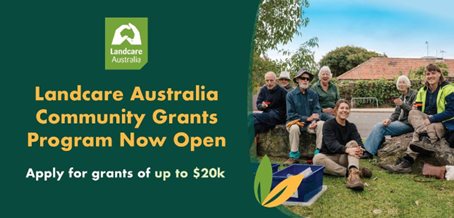
In celebration of 35 years of Landcare Australia, the 2024 Landcare Australia Community Grants Program is now open to Landcare and community environmental groups, including Landcare, Bushcare, Dunecare, Coastcare, and "Friends of" groups, First Nations organizations, and youth environmental groups (ages 18+).
The grants will support projects such as habitat restoration, weed and pest management, community workshops, and collaboration with Traditional Owners, among other Landcare activities. A total of $300,000 in funding is available, with individual grants ranging from $5,000 to $20,000 (excluding GST). Applications open on 5 August 2024 and close on 20 September 2024, with projects to be completed by 31 July 2025.
For more information or questions, contact Landcare Australia at 1800 151 105 or grants@landcareaustralia.com.au.

Koala breeding season has officially begun, which means increased koala activity on our roads. Koalas can be on the move at any time of day, though they will be more difficult to see during dusk and dawn.
Last year, Friends of the Koala received 71 reports of koalas who were hit by cars, most of them within Lismore LGA. Unfortunately, 80% of koalas hit by vehicles last year did not survive the impact.
Here's what you can do to help:
- Be extra careful while driving.
- Report every koala you see close to or on a road to the 24/7 Friends of the Koala Inc. rescue hotline (02 6622 1233) immediately, whether they appear healthy, injured or dead. This could save their life or the life of a joey in their pouch.
- Save the phone numbers of Northern Rivers wildlife rescue organisations in your phone so you are ready to report any sightings or accidents. For koalas across the Northern Rivers, call Friends of the Koala at 02 6622 1233.
Why are koalas more active at this time?
- Male koalas will be moving from tree to tree trying to find a mate and might travel quite a distance if their habitat is fragmented.
- Females might also be on the move to avoid males.
- Younger koalas, the previous season's joeys, are also dispersing from their mothers and are particularly vulnerable during this time.
All of this means that koalas are far more at risk of being struck by a vehicle because their habitat is so close to roads and residential properties.
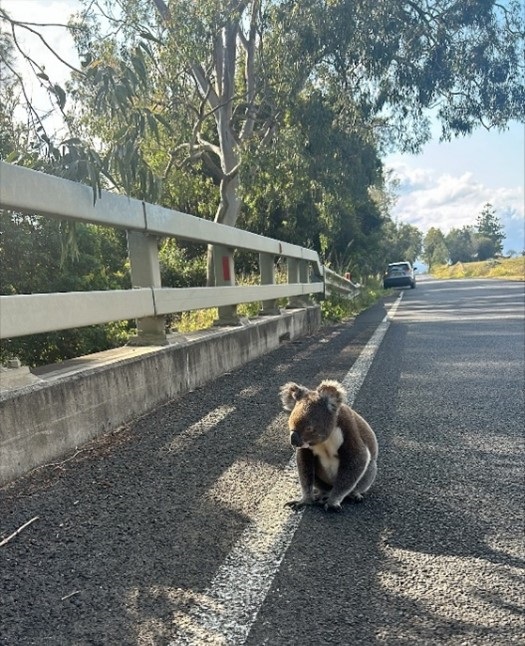
Recently, a staff member from LCC found a koala on a bridge near Coraki. The staff member stopped, called Friends of the Koala, and stayed with the koala until FOK arrived to rescue it to ensure its safety. Luckily, the koala was unharmed by traffic and was released back into the wild.
Friends of the Koala are hosting a fundraising luncheon on Save the Koala Day, which will take place on 27 September, 2024, at Crystalbrook Byron Bay.
The event kicks off with food and bubbles and will feature special speaker Geoff Cousins AM, as well as a line-up that includes great auction and raffle prizes, short and engaging speeches, and a cute koala video. Tickets can be purchased here.
Auction and raffle prizes include:
- One night accommodation at Crystalbrook Vincent valued at $500
- One spa treatment 60 minutes Eleme valued at $175.00
- A Jurlique beauty product box valued at $410
- 2 x lesson vouchers @ Fliteboard Gold Coast valued at $450
- Two gift cards from Zulu & Zephyr and Sunday Supply Co. valued at $400
- A painting by Artist John Dahlsen – valued at $3000
- 6 special bottles of 18-year-old red wine, unavailable for purchase anywhere else in Australia valued @ $900
The luncheon aims to raise funds for the conservation and protection of koalas in our region. The Friends of Koalas Hospital cares for more sick, injured, and orphaned koalas than any other Koala Hospital in New South Wales, Queensland, or Victoria.
The Northern Rivers Koala Hospital treats over 350 koalas each year and is dedicated to koalas, with a Koala Care Centre and Research & Diagnostics Laboratory on-site.
If you are unable to attend in person, please consider donating to this wonderful group through the ticket link or by becoming a Friend of the Koala Hospital.
There are various ways to support Friends of the Koala, which you can find here: support us. Donors have the option to make a one-time or recurring monthly donation. ‘Adopt' a koala and receive a lovely certificate with stories of a koala in return and much more.
In October 2024, the Lismore City Council will begin accepting Expressions of Interest for the Rural Landholder Initiative Community Grants.
This program is designed to fund projects by community and industry groups that achieve large-scale strategic outcomes by collaborating with multiple landholders, neighbours, and industry stakeholders. Up to $50,000 will be available over three years for on-ground activities such as:
- Geographically connected bush regeneration projects: Initiatives involving neighbouring properties or creating habitat corridors.
- Projects with a common theme across the Lismore City Council Local Government Area (LGA): Efforts focusing on koala habitat restoration, regenerative farming practices, or other nature-based solutions.
Interested groups are encouraged to review the guidelines available on the Rural Landholder Initiative website and begin planning their projects. Proposals should align with the principles of the Lismore City Council Biodiversity Management Strategy and aim to benefit the wider rural communities within the LGA.
Who Can Apply?
The Council invites applications from community groups that have a suitable governance structure for managing public funds. This includes incorporated Landcare groups, industry bodies, and other non-profit organizations whose missions align with the Council’s Biodiversity Management Strategy.
Funding Priorities
Projects that address the following themes will be prioritized:
- Native Habitat Health and Connectivity: Improving and connecting natural habitats.
- Environmental Improvements through Regenerative Farming: Enhancing environmental practices within agriculture.
- Nature-Based Solutions for Resilience: Initiatives that mitigate floods and droughts, build landscape resilience, and improve overall catchment health.
- Community Engagement and Capacity Building: Programs that enhance community involvement and agricultural industry skills.
While many projects will focus on traditional environmental improvements, the Community Grants program also encourages innovative and collaborative solutions for managing rural landscapes. If your project idea doesn’t fully align with the outlined themes, you’re encouraged to discuss it with council staff before applying.
How to Apply
Expressions of Interest will be accepted through an online portal, open from 1 October, 2024, to 2 February, 2025, giving groups ample time to develop detailed plans.
To assist applicants, a community information drop-in session will be held in November. This session, designed to offer advice and guidance, will take place at a central location and be available during both business and after-hours. For more information about the session and updates on the Community Grants program, visit the Rural Landholder Initiative website.
- Lismore Library Meeting Room
- At Lismore Central Shopping Centre
- Thursday 7 November, 2024
- 3pm to 7pm.
*subject to change - see Council’s Facebook page for updates closer to the event date
We are excited to be launching our community grants delivery of the Rural Landholder Initiative and looking forward to your receiving you’re your applications for strategic projects aimed at enhancing the biodiversity of and building the capacity of our rural communities.
For further details please contact The Rural Landholder Initiative officer, David Dreher on 02 6625 0500.
For any additional information on the previous articles, don’t hesitate to contact the Environmental Strategies team at Council at environmentalstrategies@lismore.nsw.gov.au or 02 6625 0500.